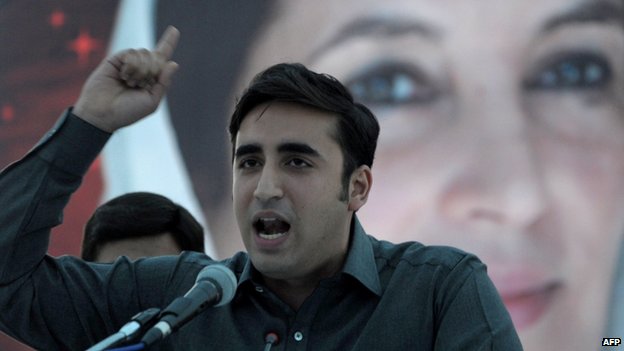Sunday Times 2
The political birth of another Bhutto
Bilawal Bhutto Zardari has played a role in Pakistani politics since before he was even born.
I remember his heavily pregnant mother Benazir Bhutto campaigning in 1988, as Pakistan returned to electoral politics after the sudden end of martial law.
“There was a story that the elections had been timed to coincide when I was meant to be born,” Bilawal Bhutto recalled as we looked at framed photographs of the baby Bhutto with his mother, who swept to power a few months after his birth.
“I was born early so we thwarted their plans,” he explains with a wide grin, referring to reports at the time that political rivals were scheming to ensure maternal duties would put his mother out of political action.

Bilawal Bhutto Zardari lashes out at the government in front of a poster of his late mother, in 2013 (AFP)
Twenty five years on, her eldest son is still the target of sinister plots.
There are death threats from the Taliban and other armed groups, and he lives under constant scrutiny and surveillance.
His critics call him “a Twitter politician” – a reference to enthusiastic engagement with the safer world of social media – and ask whether he is tough enough, even Pakistani enough, to survive the rough and tumble of modern Pakistani politics.
“I am the son of Benazir Bhutto and I have been watched my entire life,” he says in a rare interview at the heavily guarded family compound in Karachi that bears his name. “Everyone is looking and watching.”
But if any of it bothers him now, he doesn’t show it.
Identity politics
The day we meet he is bouncing with energy and confidence in the run-up to the Sindh Festival he is organising. A cultural festival, it is designed to reinforce a sense of his commitment to his country.
He speaks passionately about the urgency to save Pakistan’s cultural heritage including ancient Indus Valley sites like Mohenjo-daro, now crumbling and crying out for help.
But he bristles slightly when I point out that many of these treasured sites lie in the stronghold of his Pakistan People’s Party which should have exercised its duty of care.
“Not quite true,” he shoots back.” Obviously we did preside for the last five years in the last government, but the devolution process from the federal government has only just started.”
There has also been criticism that by holding part of the festival at the Mohenjo-daro ruins, the event itself will damage the Bronze Age site.
The two-week festival is an extravaganza of culture, from kite-flying to cricket, the latest fashion, films, music and of course Mohenjo-daro itself.
It focuses on his home province of Sindh, but Pakistanis and politicians from around the country have been invited to celebrate “what binds us together”.
Fighting words
For Bilawal Bhutto, this cultural campaign is about something much bigger, much bolder.
“For me, the fight we are not fighting is the cultural and societal space we cede to extremists on the left and right.”
In the interview, he moves seamlessly from discussing what he calls the “soft power” of a cultural ambassador, to vocally confronting the most dangerous kind of hard power.
As parliamentarians argue in Islamabad over how best to tackle a troubling rise in violence, Bilawal Bhutto is firm: “I think we’ve exhausted the option of talks,” he says. “Dialogue is always an option but we have to have a position of strength. You have to beat them on the battlefield.”
These are fighting words, and dangerous ones too.
Some commend him for speaking out when so many are silent – or silenced, by the fear of reprisal. He repeatedly praises the courage of teenage schoolgirl Malala Yousafzai, who was targeted by the Taliban, and Police Chief Chaudhry Aslam, who led operations against militants, until he was killed in Karachi recently.
Others point out it is a lot easier to denounce other politicians as “cowards” from behind high walls and an elaborate security detail.
But Bilawal Bhutto’s narrative is rooted in his own family’s tragic story.
“How long do we have to wait?” he asks rhetorically. “I thought the assassination of my mother would wake people up.”
His main focus now is on what he has to offer. There is a growing sense that he is embracing the life he says he “did not choose – it chose me”.
Six years after he was thrust onto the political stage by his mother’s assassination, and following a few years at Oxford University and a “ringside seat” at his father Asif Ali Zardari’s presidency, he says: “I think it is time to start taking on more responsibility within the party.”
He denies persistent reports of fiery arguments with his father over the programmes and performance of their Pakistan People’s Party, which was trounced in last year’s elections, and when Mr Zardari appears at Bilawal House, there is an affectionate father-son moment.
“There are closed door discussions as to what went wrong and how we can do better,” he concedes after repeated questioning. “But that doesn’t take away from the things I am proud of, the historical achievements that we achieved.”
At 25, he’s now old enough to run for parliament and says the possibility of running in a by-election is “under constant discussion” by the party.
But his “main aim” is the next general election in 2018.
Would he like to be prime minister, like his mother and grandfather?
“Obviously you are not going to believe me, but it’s not the main aim, the focus,” he insists.
Bilawal Bhutto will always carry a lot of the past with him, but, to hear him tell it, he is now trying to work out what he, and Pakistan, have in mind for his future.
(Courtesy BBC)

